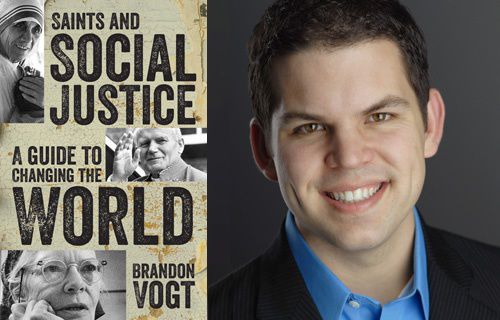Dignity of the human person, solidarity and care for creation are just a few topics author Brandon Vogt discusses in his new book, “Saints and Social Justice: A Guide to Changing the World.” “I hope that this book is a ringing call to saintliness for all readers to say, ‘I want to be a saint and here’s the game plan for doing it,’” Vogt told CNA July 11. The book focuses on seven basic themes of Catholic social teaching — life and dignity of the human person; call to family, community and participation; rights and responsibilities; option for the poor and vulnerable; dignity of work and the rights of workers; solidarity; and care for creation. It uses examples of the saints to show how those themes can be lived out in daily life. “There’s lots of books on Catholic social teaching that are helpful in terms of the theoretical principles they provide, but most of them are very abstract. That’s what makes Catholic social teaching difficult — it’s hard to apply.” By providing readers with examples of how real people practiced the principles of Catholic social teaching, he hopes that readers will be able to more easily live them out themselves. Vogt first became interested in learning more about the Church’s teaching on social justice when he converted from Protestantism in 2008. Like many young Evangelicals, he was “extremely enthusiastic” about social justice. When he brought up these ideas to his fellow Catholics, he quickly realized that there were many negative connotations attached to the idea of social justice. “The more I started reading and learning, I discovered that over the last several decades, these words and phrases have really been twisted and hijacked for all sorts of purposes, but why that worried me was that one of the things that led me to the Catholic Church was social teaching,” he explained. In reading Church teachings, writings of the saints and encyclicals, he found a “disconnect” between what the Church actually taught and how certain words and phrases were interpreted “on the street.” “I wanted to fix that, I wanted to sort of reclaim Catholic social teaching and give it an authentic presentation and I figured the best way to do that was by availing by the lives of the saints,” Vogt said. For each of the Church’s teachings on social justice, Vogt chose two saints whose lives highlighted a particular principle. The most important of the Church’s social teachings is belief in the dignity of the human person, which Vogt called “the first and most fundamental principle.” “We believe that, for instance, it’s wrong to kill an unborn child, or an elderly person constrained to a wheelchair, because every person has inviolable dignity that was a result of them being created in the image and likeness of God,” he said. “It’s that principle that drives everything that Catholics do to help the world whereas non-believers really don’t have a basis in the same way that religious people do, especially Catholics.” In his book, Vogt chose Blessed Mother Teresa and St. Peter Claver to highlight this principle. Mother Teresa not only dedicated her life to serving the poor, but she also brought them dignity by seeing them as Jesus in the “distressing disguise of the poor.” Similarly St. Peter Claver, who ministered to African slaves in South America, saw each person as a reflection of God and dedicated his life to living as “the Slave of the Slaves.” Vogt said he also wanted a wide variety of saints in his book so a wide audience would find them relatable. He chose single or married members of the laity as well as religious and clergy of various ages and times in history to highlight the different parts of Catholic social teaching. “We often times see the saints as museum pieces on pedestals that are unapproachable and unattainable, but really when you read this book and you read the stories of their own struggles, their own travails, their own difficulties and challenges, they’re in many ways a lot like us,” he explained. Vogt is not only writing about social justice, he is also seeking to live it out, as evidenced by his decision to donate all royalties of the book to Catholic Charities. “I’m in a position where I have a job, I have food and I have drink and I have a home, so I didn’t necessarily need the money,” he said. “I figured I’d put into practice what I was advocating throughout the entire book.” “Saints and Social Justice” is available through Our Sunday Visitor publishing.

